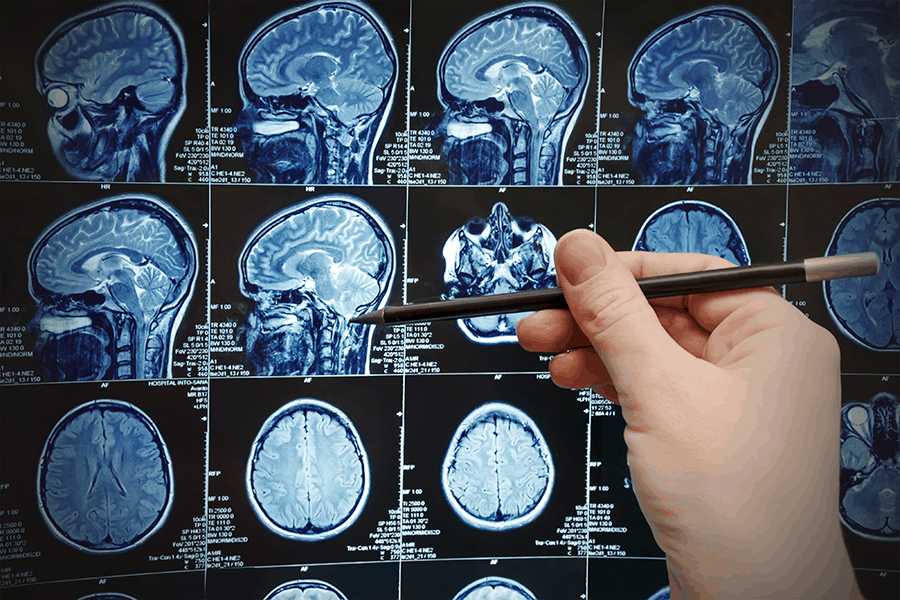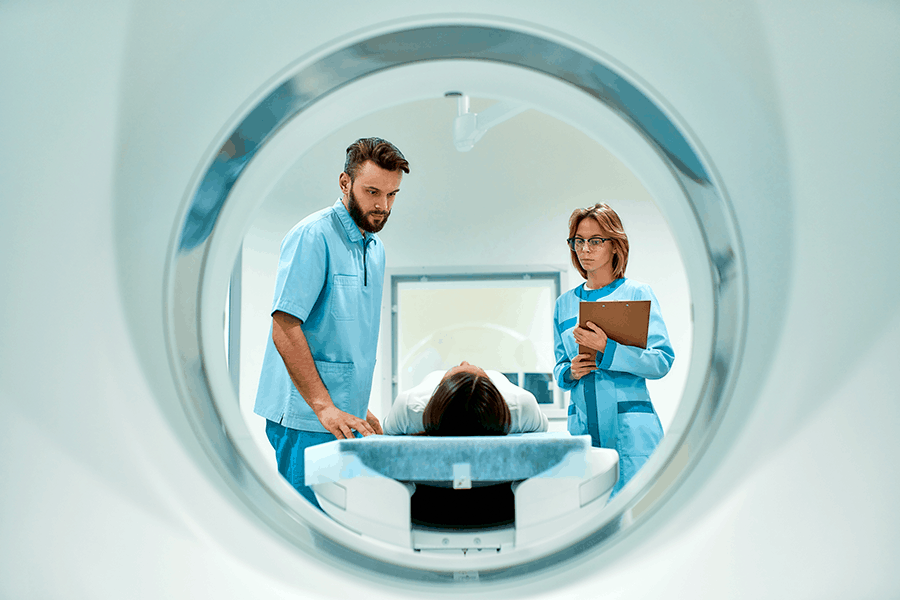Brain Tumors
- What are the types of brain tumors?
- How are brain tumors measured?
- What causes a brain tumor?
- What are the symptoms of a brain tumor?
- What treatments are available for a brain tumor?
- How can Orlando neurosurgery help?
Brain tumors occur when abnormal cells grow in the brain. These abnormal cells can show up initially in the brain, or migrate there from other parts of the body. More than 700,000 people are living with a diagnosed brain tumor today.
What Are the Types of Brain Tumors?
 There are more than 150 documented types of brain tumors. Brain tumors can be benign (non-cancerous) or cancerous.
There are more than 150 documented types of brain tumors. Brain tumors can be benign (non-cancerous) or cancerous.
The two primary groups of brain tumors are:
- Primary, or glial, that originate within the brain. Can be benign or malignant.
- Metastatic, which are typically cancerous tumors that form in other parts of the body and migrate through the bloodstream to the brain
Some of the benign primary brain tumors include:
- Craniopharyngiomas occur deep within the brain structure, making these non-cancerous tumors particularly difficult to remove
- Gangliocytomas occur most frequently in young adults
- Meningiomas are the most common brain tumors
- Pineocytomas are slow growing, occurring typically in adults
- Pituitary adenomas are slow growing and most can be treated successfully
- Schwannomas grow along the nerves
The glioma “family” of tumors is the most common type of primary malignant brain tumor. Gliomas makeup nearly 80% of malignant primary brain tumors. There are several types within this category which can range from slow growing to highly aggressive. Other types of malignant primary brain tumors include:
- Hemangioblastomas, which are slow growing and commonly located in the cerebellum
- Oligodendrogliomas can form in both children and adults
- Rhabdoid tumors are, fortunately, very rare because they are highly aggressive
There is also an entire subset of brain tumors affecting children. In fact, more than 4,200 children are diagnosed with a brain tumor in the United States each year.
How Are Brain Tumors Measured?
Tumor grading allows clinicians to easily communicate information about the severity and treatment options for a brain tumor.
The World Health Organization developed a grading scale for brain tumors, ranging from Grade 1, which are the least invasive and most curable, to Grade 4, which have poorer outcomes. Their scale looks like this:

Grade 1
- Least malignant, slow growing, possibly curable
- Types of tumors: Craniopharyngioma, gangliocytoma
Grade 2
- Slow growing tumors that may recur later
- Types of tumors: Oligodendroglioma, pineocytoma
Grade 3
- Malignant and infiltrative
- Types of tumors: Astrocytoma, which is a type of glioma
Grade 4
- Most malignant, aggressive
- Types of tumors: Glioblastoma, pineoblastoma
What Causes a Brain Tumor?
The ABTA says, “Most of the time, we don’t know what causes a given person to develop a brain tumor.”
Medically, doctors know that certain risk factors may predispose someone to developing a brain tumor. Smoking has been linked to cancer, and is something we can control. However, other risk factors such as genetics and age, we simply cannot control.
The AANS also says, “Brain tumors are thought to arise when certain genes on the chromosomes of a cell are damaged and no longer function properly.” While this is technically correct, what we don’t know exactly is what combination of environmental, genetic, and even lifestyle choices, cause these chromosomes to break down. We simply don’t know yet why one person in a particular environment develops a brain tumor while another in the same environment may not.
What Are the Symptoms of a Brain Tumor?
The symptoms of a brain tumor can vary by where it is located, its type, and size. Some general symptoms of a brain tumor can include:
- Balance and coordination issues
- Behavioral or personality changes
- Blurred vision, loss of vision, or other vision problems
- Confusion or disorientation
- Facial numbness or tingling sensation
- Headaches that increase in frequency and severity
- Hearing issues
- Loss of sensation or weakness in an extremity
- Nausea or vomiting that is sudden or unexplainable
- Problems with speech
- Seizures
If you have these symptoms, please seek treatment immediately.
What Treatments Are Available for a Brain Tumor
 There are multiple treatments available to treat brain tumors. Those treatments depend upon the type of cancer, the grade of the cancer, and your overall health.
There are multiple treatments available to treat brain tumors. Those treatments depend upon the type of cancer, the grade of the cancer, and your overall health.
The first step in treating a brain tumor is to diagnose the issue. Doctors typically use several types of painless imaging technologies to evaluate a brain tumor. They can include:
- Computed tomography (CT/CAT scan)
- Magnetic resonance imaging (MRI)
- Magnetic resonance spectroscopy (MRS)
- Positron emission tomography (PET scan)
These tools allow the doctor to visualize the tumor, its size, and location. However, sometimes the best way to diagnose the brain tumor is to conduct a biopsy. This is a surgical procedure to remove a small portion of the tumor to assess whether it is benign or malignant.
Once the tumor is diagnosed, your clinical team will swing into action to develop an individualized treatment regimen to treat the disease. Typically, the treatments consist of surgery, radiation, and chemotherapy together or separately depending on the diagnosis.
The goal of surgery is to remove as much of the brain tumor as is beneficial for your health without injuring the surrounding tissue. Radiation therapy uses targeted X-rays to kill abnormal cells and shrink tumors without damaging healthy tissue. Radiation therapy may be a good option if the tumor cannot be surgically excised. Chemotherapy is a type of drug treatment that uses powerful chemicals to kill off fast growing cells in the body.
There are also a variety of new treatments coming to the forefront along with improvements to these existing treatments. As a result, the diagnosis of even the most aggressive malignant tumors does not mean that the patient’s chances are grim. Talk with your doctor to learn more.
How Can Orlando Neurosurgery Help?
If you receive a diagnosis of a brain tumor, it can be terrifying. However, the science behind treating these diseases is rapidly advancing every day. The team at Orlando Neurosurgery treats these disorders regularly and is devoted to the most state-of-the-art approaches designed to help diagnose and get you back to health. Talk with our team today about your options.
Sign Up for Our Newsletter
Get the latest news and updates from Orlando Neurosurgery delivered straight to your inbox.


